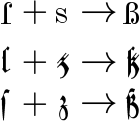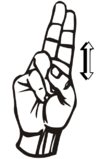Definify.com
Webster 1913 Edition
S
S
Webster 1828 Edition
S
S
, the nineteenth letter of the English Alphabet, is a sibilant articulation, and numbered among the semi-vowels. It represents the hissing made by driving the breath between the end of the tongue and the roof of the mouth, just above the upper teeth. It has two uses; one to express a mere hissing, as in Sabbath, sack, sin, this, thus; the other a vocal hissing, precisely like that of z, as in muse, wise, pronounced muze, wize. It generally has its hissing sound at the beginning of all proper English words, but in the middle and end of words, its sound is to be known only by usage. In a few words it is silent, as in isle and viscount.Definition 2026
SS
SS
English
Abbreviation
SS
Initialism
SS
- Schutzstaffel
- social security
- Subsahara, Subsaharan
- spousal support
- steam ship
- **** Steamer - ****-driven steamship
- (US, Navy) Sub Surface - diesel powered attack submarine
- (military, rocketry) NATO prefix-code for surface-to-surface missile systems developed by the Soviet Union
- (baseball) shortstop
See also
ß
ß
| ||||||
|---|---|---|---|---|---|---|
German

Symbol
ß (lower case, upper case SS, occasionally ẞ, or ß)
Usage notes
In alphabetic ordering, ß is equivalent to the string ss (formerly sz), so aß (“ate”) is sorted between Aspirin (“aspirin”) and Ast (“branch”), immediately after the alphabetically equivalent Ass (“ace”).
The letter is never used in Swiss or Liechtenstein German, where it is replaced by ss, so Straße is written Strasse. It is also almost unique among the Latin letters as there is no uppercase form. In all German-speaking countries, the letter is usually replaced with SS (STRASSE) when writing in uppercase, but the letter is sometimes used directly, either in its original lowercase form (STRAßE) or in the recently modified (and sometimes proscribed) "capital" form (STRAẞE). The old rule which mandated replacing ß with SZ (STRASZE) is now considered obsolete.
In German orthography, ß is treated as a letter of its own right. In the orthography from 1996 it is used instead of ss after long vowels and diphthongs. Thus „Masse“ (mass) is different in meaning and pronunciation from „Maße“ (measures). In alphabetical orders, the former would come directly before the latter if otherwise they are alphabetically equivalent. Both can be rendered MASSE in capitalization (whereby the distinction is then lost), but „Maße“ may also be spelled MASZE or MAßE.
The above-mentioned rule for the use of ß and ss was changed in the 1996 spelling reform. Before this reform ß also occurred after short vowels at the end of a word or before a consonant. Therefore a rather large number of words that used to be spelt with ß, are now spelt with ss (for example, daß has become dass). The older spelling has become rare, but is still found in the products of a few (conservative) publishing houses.
